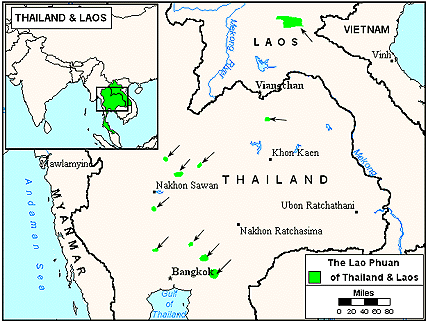|
|
Prayer Profile
The Lao Phuan of Laos
![[IMAGE]](../images3/0516.jpg) Over 98,000 Lao Phuan live in Laos, while another 93,000 live in the neighboring country of Thailand. Both groups speak Phuan, a language that belongs to the Chiang Saeng branch of the Diac language family. In Thailand, the term Lao phuan usually means "transported Lao," and refers to any Lao-speaking person. However, the Lao Phuan are a distinct, socially prominent ethnic group who value their own language and identity.
Over 98,000 Lao Phuan live in Laos, while another 93,000 live in the neighboring country of Thailand. Both groups speak Phuan, a language that belongs to the Chiang Saeng branch of the Diac language family. In Thailand, the term Lao phuan usually means "transported Lao," and refers to any Lao-speaking person. However, the Lao Phuan are a distinct, socially prominent ethnic group who value their own language and identity.
The Lao Phuan claim to be the descendants of the Tai. During the thirteenth century, the Tai immigrated to Thailand from southwestern China due to Chinese oppression. As they journeyed, they conquered many peoples and cultures along the way. From 1827 to 1890, many of the Lao Phuan were taken from Laos to Thailand as captives of war. The largest majority, however, remained in Laos. Throughout their history, repeated cycles of warfare and resettlement have caused massive social upheaval for the Lao Phuan.
What are their lives like?
Most of the Lao Phuan are subsistence farmers, living in fertile, green valleys where they cultivate wet-rice. They make use of irrigation and terraces and also engage in some "slash and burn" agriculture on the mountain sides. Some Lao Phuan, especially in villages along trade routes, have specialized in occupations other than farming, such as blacksmithing. New road construction projects in the area are allowing more accessibility to markets for them. In addition, as the economy improves, rice farmers have found new jobs as merchants, businessmen, skilled workers, and civil servants.
The Lao Phuan are organized into small village kingdoms limited to a single valley under the control of a chao muong, or prince, to whom the commoners pay taxes. Social justice is usually dispensed by a village headman in the presence of village elders. Within the villages, the wealthier Lao Phuan live in sturdy, teak or mahogany paneled houses that are raised off the ground and have a plank floor and tile roof. The less wealthy live in low-pitched, bamboo-framed houses with thatched roofs and earthen floors. The most important institution in the village is the temple, which symbolizes unity and provides a variety of activities for the people.
The basic social unit of the Lao Phuan is the family. Although the foundation of their social structure is patriarchal (ruled by males), relations between husband and wife are harmonious. There is almost no division of labor by sex. Both men and women plow, fish, cook, tend babies, clean house, and wash clothes.
In general, the Lao Phuan are hard-working, honest, and peaceable. They are thrifty and habitually save things for future use. Lao Phuan social life revolves around "merit-making" ceremonies, ordinations of monks, marriages, and housewarmings. In Bangkok, a large annual celebration called the "ceremony of the rice packet" is held in honor of the spirits.
What are their beliefs?
While the Lao Phuan of Thailand are primarily Buddhist, 96% of the Lao Phuan in Laos practice traditional ethnic religions. Many of them have mixed Buddhism with folk animism, a practice in which they seek help through the worship of spirits and objects. They believe in "guardian spirits" and "locality spirits," which are identified with different levels of society. They believe that one must please these spirits in order to avoid curses and receive blessings.
What are their needs?
The Lao Phuan are without any Christian resources in their own language. Although two missions agencies are targeting the Lao Phuan of Thailand, there are currently no missions agencies working among those living in Laos.
Prayer Points
- Ask the Lord to send laborers who can minister the love of Jesus to the Lao Phuan.
- Pray that Christian radio broadcasts, evangelical literature, and the Jesus film will be made available to the Lao Phuan.
- Ask the Lord to raise up linguists to translate the Bible into the Phuan language.
- Pray that God will reveal Himself to the Lao Phuan through dreams and visions.
- Pray that God will give the Lao Phuan believers boldness to share Christ with their own people.
- Take authority over the spiritual principalities and powers that are keeping the Lao Phuan bound.
- Ask God to raise up prayer teams who will begin breaking up the soil through worship and intercession.
- Ask the Lord to bring forth a triumphant Lao Phuan church for the glory of His name!

Statistics
Latest estimates from the World Evangelization Research Center.
THE PEOPLE
- People name: Lao Phuan
- Country: Laos
- Their language: Phuan
- Population:
- Largest religion:
- Christian: 1.8%
- Church members: 1,766
- Scriptures in their own language: None
- Jesus Film in their own language: None
- Christian broadcasts in their own language: None
- Mission agencies working among this people: 0
- Persons who have heard the Gospel: 17,500 (18%)
- Persons who have never heard the Gospel: 80,600 (82%)
THEIR COUNTRY
- Country: Laos
- Population:
- Major peoples in size order:
- Major religions:
- Number of denominations: 8
© Copyright 1997
Bethany World Prayer Center
This profile may be copied and distributed without obtaining permission
as long as it is not altered, bound, published
or used for profit purposes.
![[HOME BUTTON]](../graphics/home.jpg)
![[CALENDAR BUTTON]](../graphics/calico.jpg)
![[LIST BUTTON]](../graphics/listico.jpg)
[Home]
[Calendar]
[Country List]
|